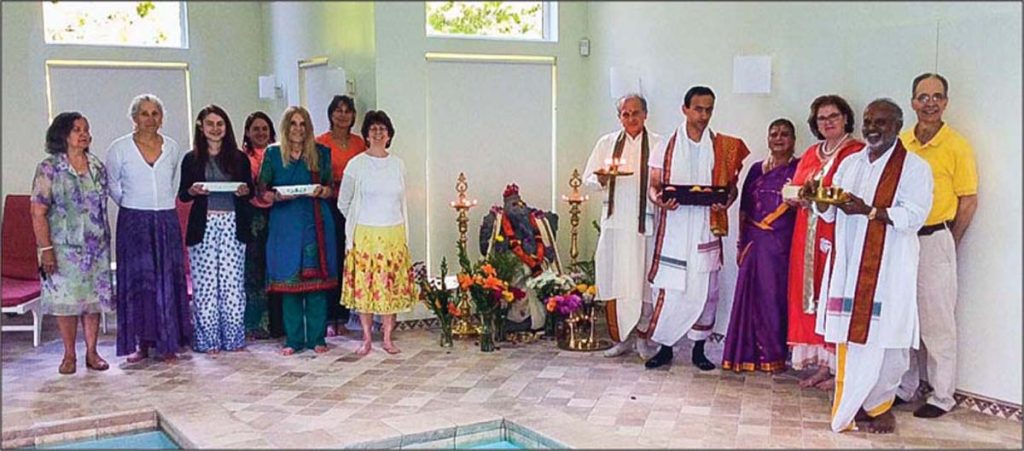How a stay-at-home mom, whose child grew up and left home, reinvented herself to overcome the “empty nest” syndrome
By Vatsala Sperling, US
For our first wedding anniversary in the green mountains of rural Vermont, my husband, Ehud Sperling, presented me with a book, The Organon of the Medical Art by Samuel Hahnemann, the visionary 19th-century physician who first developed homeopathic medicine. I looked through the book once and asked why he gave me a book instead of a more romantic present, say, a piece of fancy jewelry! Having founded a highly successful publishing company when he was twenty-four years old and having worked with scores of women on his staff, he had a fairly practical idea about what would make a perfect gift for his wife. “Books change lives,” he said. I chose not to argue and put the book away without realizing that in a not-too-distant future this book would open new doors for me.
Years ago, as our son prepared to come into our lives, I got busy with motherhood. I made friends with women in my neighborhood and watched them raise their kids. When one of them sent their kid to college, other mothers would ask her, “How is the empty nest?” I was awestruck when I heard this phrase for the first time. “Women are not birds. They do not build nests, ” I thought. “Kids are not hatchlings who fly off the nest the moment their wings can carry them. Why do Americans compare the experiences of women whose kids have gone away to school with that of a mother bird?”
I was raised with the Hindu cultural tradition of viewing life in four stages, brahmacharya (childhood and student life), grihastha (householder), vanaprastha (retirement) and sannyasa (renunciation). When following this path, Hindu culture ensures that you grow spiritually within yourself and make peace with every stage. This means that when the time comes, you can embrace the sannyasa stage and successfully reach the ultimate aim of life—a state of loving detachment and inner renunciation. This Hindu attitude toward life does not mention an “empty nest.” I had never heard the phrase in India where I grew up. But here in the US, the question was common, “How is the empty nest?” “This must be a purely American phenomenon,” I said to myself, as I tried to understand the culture in which I found myself living and raising our son Mahar.
Mind you, Vermont is a pretty homogenous, white state. I was the only woman of Indian origin in my town. Around me were all sorts of mothers. Some chose to put their education, job and career on hold and become full-time mothers, as I had done, and others continued to work while sending their kids to day care. Whatever choices the women around me made, I could see in them the presence of an efficient, skillful, multitasking Goddesses with the ability to juggle jobs and family life, some without a husband or partner. These women raised kids, managed their households, paid the bills and made sure everyone’s needs were taken care of. Their lives were a hectic 24/7 drama with no intermission. They reminded me of the Ashta Lakshmi—the eight forms of Goddess Lakshmi: Dhana, Dhyana, Santana, Veera, Vijaya, Vidya, Saubhagya and Vara Laksmi. I felt grateful to my Hindu culture for helping me recognize the Goddess in each of these women.
As we all know, kids grow up and move on in search of education, jobs or relationships. The intense years of child-rearing eventually come to an end. Particularly in the West, where most Hindu households have nuclear families, Indian women get a taste of the empty nest just like their non-Indian sisters. Women who stay with their jobs or careers while raising kids might find themselves relishing the new-found freedom once kids leave home, but those who chose to be full-time moms are hit hard with this syndrome. Their spouse is busy with his career, the kids are away, and the house is empty. The woman has little to do, nothing to look forward to, except the holidays when the kids will be home again.
Reinvent in Advance
I can now understand—my son having just gone off to college—how Western, home-bound women inevitably face the empty nest! Society and culture here lack the depth to ease their transition into a new stage of life. But I realized that we can counteract one American phrase, “empty nest,” with an equally potent and practical American phrase, “reinventing myself.” As women, on the day our kids are born we have to ask ourselves the question, “How am I going to deal with the empty nest when it comes around?” This question, as noted earlier, is especially relevant to those who choose to be stay-at-home moms.

Reinventing ourselves finds its roots in a clear understanding of the four stages of life and in seeing how each stage is a stepping-stone that helps us prepare for and grow naturally into the next stage in a seamless, organic and life-affirming manner. Here in the West, reinventing oneself is a well known down-to-earth business of assessing one’s strengths, weaknesses, ambitions, desires, dreams, skills and talents.
While our children are small and still in our care, we would be well advised to take stock of these aspects of ourselves and steer our life in a direction that considers our future. In practical terms, it could mean acquiring a fresh education, keeping a hobby that could be turned into gainful work, mastering new skills that could help us re-enter a job market, learning a new profession, or preparing to volunteer in our community, if we happen to be financially comfortable. After all, we have over a decade of time on our hands to plan and prepare for the day when our kids will fly from the nest. With this focused preparation we can then turn a new page in the book of life, instead of moping around the house, complaining of loneliness and boredom, having nothing to do.
Destiny is a mighty force to contend with. We turn out as we are destined to. But it is also true that life, with immense kindness and wisdom, gives us choices and opportunities for growth, self-development, self-realization and self-fulfillment. We are meant to nurture not only our family and kids, but also our own body, mind and spirit. Women would be wise to remain alert to opportunities for growth and seize them while children are still small. Once the kids move on, we can then embark upon a whole new stage of life with meaningful job, career or other pursuits for the next 25 or 30 years.
The idea is that instead of seeing life as a series of missed opportunities, we can make use of our circumstances for personal growth. It is within women’s power to create new meaning in their own life. They do not have to be left behind to stare alone at the empty nest that they so lovingly built.
In short, mothers, you should know that the day will come. Plan and be prepared for it. When it does come, you will have successfully reinvented yourself in a truly American manner. You will have transformed yourself to succeed in a new stage of your life. Life is a series of opportunities for growth, and our job is to remain awake, seize the moment and go with the flow.
The Empty Nest & Hindu Culture
I thought of writing this piece for Hinduism Today because it is particularly relevant in Hindu culture. Hindu women are encouraged since birth to be selfless mother-goddesses. No sacrifice is considered too big when it comes to raising their kids and nurturing their families. In our homeland, we are lucky to be immersed in our culture and the multi-generational extended families which ensure that women in the “empty nest” phase find something meaningful to do.
In Western society, cut off from their native culture and spiritual resources, Indian women face enormous challenges. While facing this stage in life, they may also be dealing with an aging spouse, intense loneliness, menopause and other age-related issues. If women work relentlessly at reinventing themselves while their kids are small, they will be able to sustain a meaningful and productive existence later on.
This technique of reinvention worked for me. I had left behind a thriving career as the chief of clinical microbiology services in a children’s hospital in India to marry and come to the US and raise a family as a stay-at-home mom. The book my husband presented to me for our first wedding anniversary in 1997 became a source of inspiration that launched me into a whole new path. While my son was still on my lap, I began studying homeopathy in full seriousness and today I run a successful practice in Vermont. I have clients from many states in the US, in France and a few of the South American countries. I count this as a stroke of good fortune, and I am extremely grateful for all the opportunities life presented me.
My Hindu sisters, especially in the US, who are stay-at-home moms can put the reinventing technique to use in their own lives. The good news is that their own culture offers them the tools for reinvention.
